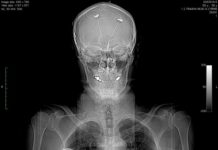Peer-Support Groups Were Right, Guidelines Were Wrong: Dr. Mark Horowitz on Tapering Off Antidepressants
In an interview with MIA, Dr. Horowitz discusses his recent article on why tapering off antidepressants can take months or even years.
55 Steps to Informed Consent
55 Steps is a new film based on a true story that centers around two women: Collette, a lawyer with a tendency to work long hours, and Eleanor, who has spent far too much time incarcerated in hospitals. Over the course of five years, Collette fights for Eleanor’s right to choose whether or not she takes psychiatric drugs. This film is imperfect, but its importance can’t be ignored.
Abolishing Forced Treatment in Psychiatry is an Ethical Imperative
Forced treatment in psychiatry cannot be defended, neither on ethical, legal or scientific grounds. It has never been shown that forced treatment does more good than harm, and it is highly likely that the opposite is true. We need to abolish our laws about this, in accordance with the United Nations Convention on the Rights of Persons with Disabilities, which virtually all countries have ratified.
Researcher Acknowledges His Mistakes in Understanding Schizophrenia
Sir Robin Murray, a professor at the Institute of Psychiatry, Psychology, and Neuroscience in London, states that he ignored social factors that contribute to ‘schizophrenia’ for too long. He also reports that he neglected the negative effects antipsychotic medication has on the brain.
Researchers Warn of “Brain Atrophy” in Children Prescribed Antipsychotics
Researchers discuss the evidence that antipsychotic medications may cause brain atrophy in children, whose brains are still developing.
Cognitive Impairment from Long-Term Benzodiazepine Use Remains Even After Drug Withdrawal
Long-term benzodiazepine use shown to effect cognitive function during current use and for years after drug discontinuation.
Comments by Shock Survivors and Their Loved Ones
The #FDAStopTheShockDevice petition has received over 2,200 signatures and 800+ comments. A more thorough analysis of those comments is forthcoming, however, we wanted to offer a glimpse of what people shared. The sixth, seventh, and eighth most common words used in the comments submitted through the petition were "damage," "barbaric" and "torture." We must continue the fight to make sure that the FDA hears the people who will be adversely affected by the proposed rule if it becomes an order. There is still a small window of time for you to sign the petition and leave a comment to the FDA.
Adverse Effects: The Perils of Deep Brain Stimulation for Depression
Hundreds of people have been given remote control deep brain stimulation implants for psychiatric disorders such as depression, OCD and Tourette’s. Yet DBS specialists still have no clue about its mechanisms of action and research suggests its hefty health and safety risks far outweigh benefits.
MIA Survey: Ex-patients Tell of Force, Trauma and Sexual Abuse in America’s Mental Hospitals
In a MIA survey of people who had been patients in mental hospitals, nearly 500 respondents told of an experience that was often traumatic, and frequently characterized by a violation of their legal rights, forced treatment with drugs, and physical or sexual abuse. Only 17% said they were “satisfied” with the “quality of the psychiatric treatment” they received.
The “Shotgun Method” – A Story of Mental Health Crisis in Iceland
"Let's try the shotgun method," my psychiatrist said — meaning that you load the gun with a bunch of pellets and hope that one of them hits the target. I went through 16 different psychiatric medications in five years, and they were not the right choice for me.
United Nations Statement Criticizes Medicalization of Depression on World Health Day
"There is a need of a shift in investments in mental health, from focusing on 'chemical imbalances' to focusing on 'power imbalances' and inequalities"
Systematic Review Finds Antidepressant Withdrawal Common and Potentially Long-lasting
Prominent researchers conduct a review of antidepressant withdrawal incidence, duration, and severity. Results lead to call for new clinical guidelines.
“Prisons Without Bars” – Forced Institutionalization of People with Disabilities
In the wake of deinstitutionalization, we no longer have the vast asylum system we once did. Instead, something more insidious has taken root — for-profit institutions that call themselves neurorehabilitation centers, group homes, and other official-sounding names.
Electroshocking Veterans and Their Fetuses
I have long been concerned with the way society responds to people who come back from war. Veterans are routinely funneled into psychiatry’s grasp. Over the decades, some people who fought in wars have shared with me their experiences of being psychiatrized upon return from war. Sometimes these experiences included veterans being stripped of their second amendment rights, and a host of other constitutional, civil, and human rights violations as they began to be forced into complying with psychiatric regimens, and on several occasions this included veterans being subjected to electroshock.
Wendy Dolin Takes on GlaxoSmithKline And Wins — For Now at Least
In July of 2010, Stewart Dolin, a partner at the mega law firm Reed Smith, jumped in front of a subway train in Chicago, apparently suffering from akathisia caused by paroxetine. His widow sued, and the jury found GSK negligent in not informing doctors of the suicide risk
Antipsychotics Associated with High Risk of Death in Children
A new study has found that children and adolescents taking a high dose of antipsychotics are almost twice as likely to die of any cause than children on other types of medications.
Feral Psychiatry: The Case of Garth Daniels
Garth Daniels, a 39-year-old Melbourne man, has been shackled for 110 days and forced to undergo ECT 94 times at three times a week against his will. Last year, his family asked me to provide a second opinion on Garth’s case. As predicted, my recommendations against continued ECT were quickly dismissed by the hospital. There are critically important issues at stake in this case.
Antidepressant Use Linked to Dementia
A new study finds that elderly individuals using antidepressants are at significantly higher risk for dementia compared to depressed individuals who did not take the drugs.
Do Antidepressants Work? A People’s Review of the Evidence
After a meta-analysis of RCTs of antidepressants was published in Lancet, psychiatry stated that it proved that "antidepressants" work. However, effectiveness studies of real-world patients reveal the opposite: the medications increase the likelihood that patients will become chronically depressed, and disabled by the disorder.
Inhumane Medicine in Germany: A Dark Chapter Continued
Although I left Ueckermünde without the ability to speak, heavily traumatized and barely able to move, I managed to reclaim life after more than a decade. Today I am one of the few witnesses who survived the Hell of Ueckermünde, who can tell the story of my companions and raise awareness of the injustice committed against us as well as demand answers.
2017: A Wake-up Call on Mental Health and Human Rights
At Mental Health Europe, we see 2017 as having been a crossroads for mental health and human rights. Let’s ensure that this yields concrete change in 2018 with the support of like-minded communities ready to take the discussion to the next level and truly enact this as a civil rights movement.
Components for a Good Neuroleptic Withdrawal Program
The United States desperately needs good programs to help people withdraw from neuroleptic drugs. From all I have seen and heard, there aren’t any - none at least that can reputably claim to get good results on a fairly consistent basis. Again and again I find myself challenged to envision such a program, and in reply to the challenge I have broken down this hypothetical program into various components.
NICE Guideline Update Acknowledges Severe Antidepressant Withdrawal
A new update to the NICE guideline for depression suggests providers discuss long-term, severe antidepressant withdrawal symptoms.
Intensive Care Patients at High Risk for PTSD, Psychiatric Symptoms
People who survive life-threatening illnesses in the intensive care unit (ICU) of a hospital are at high risk for depression and anxiety and nearly...
Your Pharmacist is Tattling On You!
A CVS pharmacy recently sent me a standardized form by fax with a dire warning about one of my patients. The form was called “MEDICATION NONADHERENCE THERAPY ADVISORY” and it said: “A review of your patient’s retail and mail prescription history indicates that the patient has not obtained his or her first refill.”





























